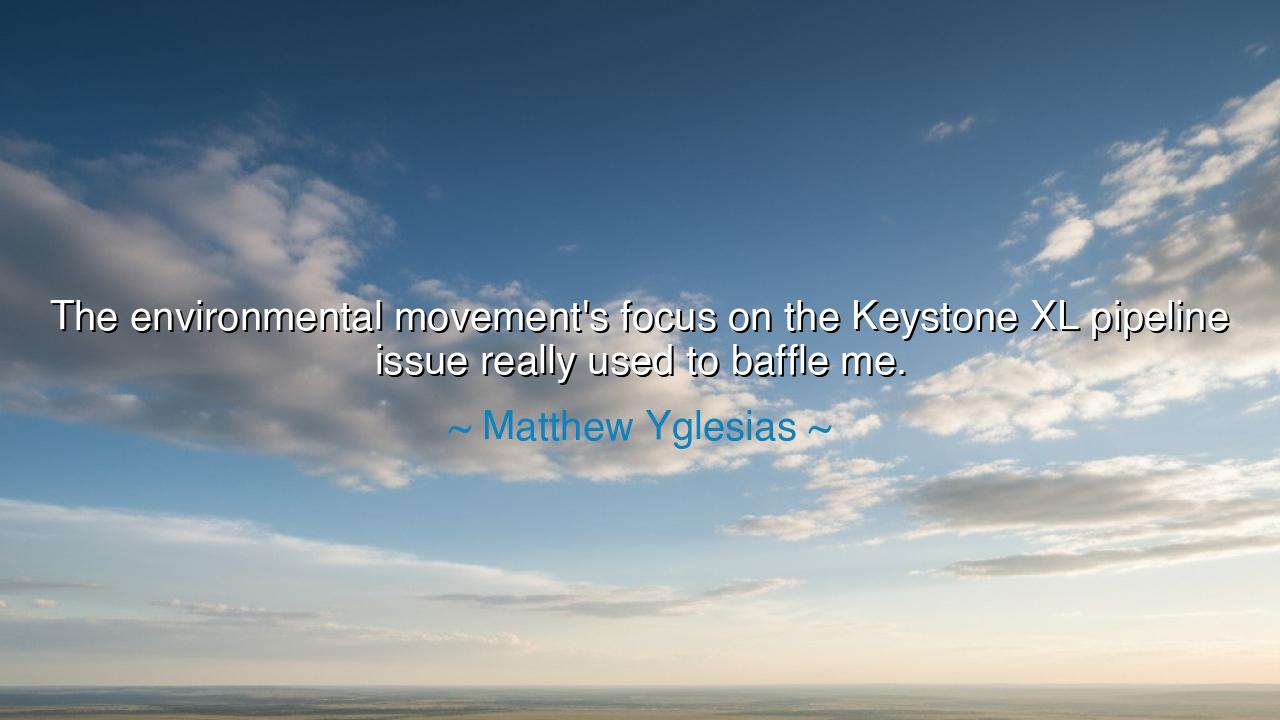
The environmental movement's focus on the Keystone XL pipeline
The environmental movement's focus on the Keystone XL pipeline issue really used to baffle me.






Hear, O listener, the reflective words of Matthew Yglesias: “The environmental movement’s focus on the Keystone XL pipeline issue really used to baffle me.” At first glance, these words appear as a confession of confusion, but beneath them lies a window into the struggle of movements, of symbols, and of strategy. For Yglesias does not deny the urgency of climate action, nor the peril of fossil fuels, but wonders why a single project—the Keystone XL—rose to stand as a banner for so many, while other, larger battles remained unseen by the multitudes.
The meaning of this teaching is subtle yet profound. The Keystone XL was not, by itself, the single greatest threat to the climate, nor the largest source of pollution. Its effect, compared to the vast ocean of global emissions, might have seemed small. Yet to the environmental movement, it became a symbol, a rallying cry, a line in the sand. To oppose it was not only to fight one pipeline, but to declare resistance against the expansion of fossil fuel dependence. Yglesias, in his honesty, reveals the tension between the logic of numbers and the power of symbols: between what “baffles” the mind and what stirs the heart.
History is rich with such moments when a cause found its symbol. Recall, O seeker, the Boston Tea Party of 1773. The tax upon tea was not, in itself, the gravest burden laid upon the colonies; other taxes and restrictions weighed heavier. Yet it was tea that became the rallying point, tea that was cast into the harbor, tea that became the symbol of resistance to empire. So too with the Keystone XL: its weight was not only in barrels of oil, but in the image of a nation choosing between the path of the past and the path of the future.
Mark also the story of Rosa Parks, who one day in Montgomery refused to surrender her seat. Segregation was a vast and cruel system, expressed in laws, schools, housing, wages, and violence. Yet it was that single act, in that single bus, that crystallized the struggle. The movement that followed was not baffled by the seeming smallness of the bus—it understood that in the small, the great can be revealed. In like manner, the pipeline became a bus-seat of the environmental age: a place where the fight for dignity and survival could be made visible to all.
Thus Yglesias’s bafflement is also a reminder: movements must choose their symbols wisely. For the human mind does not march to numbers alone—it marches to stories, to visions, to tangible battles where right and wrong can be seen. The environmental crisis is vast, and its numbers overwhelming; yet without a symbol, it is too immense for people to grasp. The Keystone XL, though only one strand in the web, became such a symbol, teaching millions to see what once lay hidden.
Let this be the lesson: do not despise the small fight if it awakens the spirit of the greater struggle. A dam, a river, a pipeline, a forest—each can stand as a doorway through which the people awaken to the truth of their age. Symbols give shape to movements; without them, passion is dispersed like mist in the wind. The wise do not ask only, “What is largest?” but also, “What will awaken the heart?”
Therefore, O child of tomorrow, take heed of both reason and passion. Learn from Yglesias’s honesty that the mind may be baffled, but the heart sees what the mind does not. Honor the power of symbols, but also work beyond them. Do not let the fight end with one pipeline, one protest, one law, but let each stand as a spark that ignites the larger fire of change. For in this way, the small becomes mighty, and what begins as bafflement becomes the wisdom of transformation.
Thus, the words of Matthew Yglesias remind us that while the environmental movement may puzzle the thinker with its choices, it teaches the world through the power of the symbol. And it is through symbols that nations are stirred, battles are won, and the tide of history is turned.






AAdministratorAdministrator
Welcome, honored guests. Please leave a comment, we will respond soon